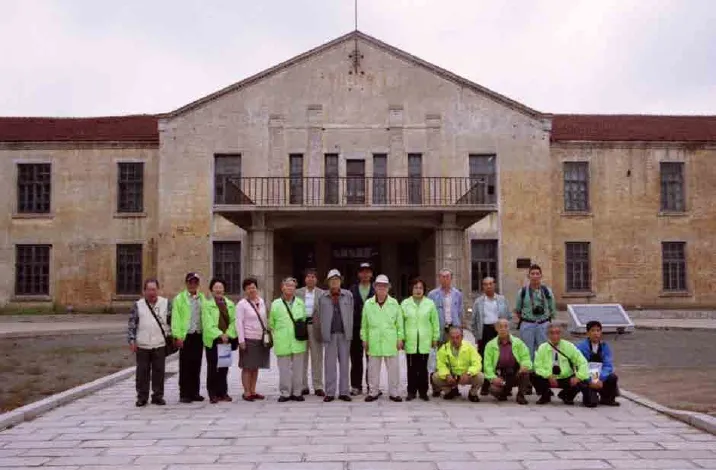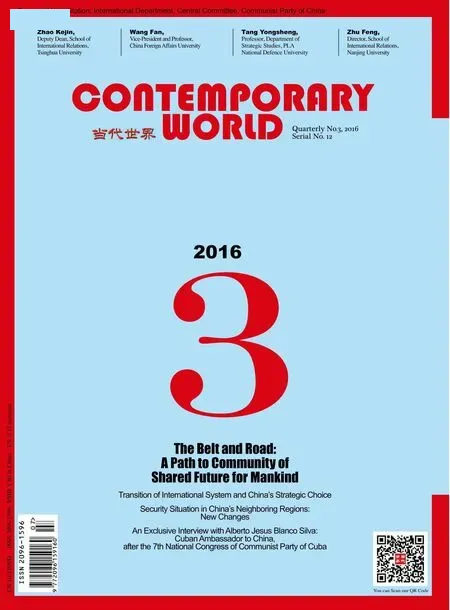Distorting History Is Not Tolerable: An Interview with Soga Yuji, President of Japan-China Friendship Association for the 21st Century
2016-09-20WANGYiDiSHiZHAoQiANLiLUQiTRANslATEANDEDiT
WANG YiDi, SHi ZHAoQiAN, Li LUQi / TRANslATE AND EDiT
Distorting History Is Not Tolerable: An Interview with Soga Yuji, President of Japan-China Friendship Association for the 21st Century
WANG YiDi, SHi ZHAoQiAN, Li LUQi / TRANslATE AND EDiT
Q: Prime Minister Abe gave a speech on 14 August 2015. In your view, what are the differences among the “Abe Statement”, the “Murayama Statement” and the “Koizumi Statement”? What are the characteristics of the historical views in the “Abe Statement”?
A: The “Abe Statement” is a huge step backwards compared with both the “Murayama Statement” and the“Koizumi Statement”. There are three reasons for me to say so. The first one is that the Statement is too lengthy,confusing and misleading. The second one is that as a product of compromise by all sides, the Statement showed no single change on Abe’s wrong historical view. The third one is the contradiction in the Statement that on the one hand, Abe promised that Japan would not appeal to arms or resort to the threat of force while on the other, Japan has approved the new security bill aimed at paving the “legal ground” for Japan’s Self-Defense Forces to exercise constitutionally banned rights to collective self-defense.
In essence, Abe’s historical view is similar to that of Shiba Ryotaro. Both of them believed that while western countries were colonizing the world,Japan was moving forward tothe modernization after the Meiji Restoration and has preserved its independence throughout. Moreover, Japan’s victory in the Japan-Russia War was a symbol of Japan’s modernization achievements.
Shiba proposed a “two phases” theory, which held that Japan had been successful in its modernization and becoming a “national state”; however,later on Japan tried to keep up with the European countries and the US by following a line of military strengthening and territorial expansion. As a result, Japan challenged the post-WWI international order and became a loser ultimately.
Meanwhile, Shiba’s historical view did not cover the history of Japan’s colonial rule. For example, the Japanese colonial domination of Taiwan and Korea was not in his book Saka no Ue no Kumo (Clouds above the Hill). In his Statement, Abe also stresses the“farewell to colonial rule”. However,he does not indicate who the subject of the colonial rule is. The common point of Shiba and Abe is that they have both clouded the fact that Japan was the victimizer.

Japan-China Friendship Association visited the historic site of the Japanese 731 troops, which committed hideous crimes to Chinese people.
Shiba’s historical view featured the agreement to the structure and values of the “national state”, and pointed out the direction for Japan’s development through depicting the process of Japan’s rapid development into a national state as well as its pursuit for economic prosperity in the 1960s and 1970s. Shiba’s books in the 1980s further indicated that Japan should overstep being a “national state” in the great wave of globalization and assimilate into the international community. However, Abe’s Statement has not involved the same content at all. Abe has only seen one side of Shiba’s historical view, and made a simple use out of context.
After the FukushimaNuclear Accident caused by the 311 Earthquake in 2011, Japan should have adopted a new goal for economic prosperity, and the Shiba Concept born in the 1960s should also be terminated. However,the Abe Declaration pursues the rebuilding of a “national state” and reviving economy with the “Abenomics”including armament expansion, which is a critical mistake.
Abe said in his Statement: “The Japan-Russia War gave encouragement to many people under colonial rule from Asia to America.” From a perspective of the Korean history, that sentence is unacceptable and absurd. Japan defeated Russia in the Japan-Russia war which was actually fought for the dominion over the Korean Peninsula and “Manchuria”. Japan gained Korea’s diplomatic right in 1905 with the second Japan-Korea Agreement,and started its colonial rule in Korea in 1910. According to a professor of the Korean Kookmin University, the Japan-Russia War was the beginning of the tragedy for the Korean Peninsula.
Prof. Kubo Toru of Shinshu University said: “The fact that Japan as a small country in Asia defeated the major power Russia in the Japan-Russia War did brought about significant impact on the national movements of India and Viet Nam. However, if we comment the Japan-Russia War on that basis, we are too much centered onJapan.” We must cast aside the historical view centered on Japan and rebuild our historical view with a broad vision to share with our neighboring countries in Asia.
Q: How do you see the approval of the new security bill in Japan after the“Abe Statement” was published?
A: The amendment of the security bill and the International Peace Support Act proposed by the Abe Cabinet are both the “war bills” that violate the Constitution. It is very abnormal for the Japanese Diet to review bills like these two that shake the legitimacy so obviously. This mistake started from the Cabinet resolution made on 1 July 2014 to allow Japan’s Self-Defense Forces to exercise constitutionally banned rights to collective self-defense. This resolution was based on the Government view published in 1972, with the following basic contents:
I. Article 9 of the Constitution doesnot prohibit necessary self-defense measures adopted for the safety of the country.
II. However, these measures must be limited to the minimum necessary dimension.
III. Therefore, it is not allowed to exercise the collective self-defense rights for preventing armed attack from other countries.
Based on the above consideration,every Japanese cabinet made the following explanation: Japan, though entitled to the rights of collective self-defense according to the international law, is not allowed to exercise them according to its Constitution;Japan has to make amendments to the Constitution if it is to exercise the rights.
However, Abe’s Cabinet made a resolution which maintained only the first and second terms. The third term has been revised to “be allowed to exercise collective self-defense rights within the minimum necessary dimension. Though with the same prerequisite, Abe’s resolution has completely different conclusion. The Japanese Government defends itself with the excuse of “fundamental changes having taken place in security environment. However, can white be called black and black white even with the changing environment? The new security bill based on this Cabinet resolution blurred the suspicion of violating the Constitution, yet was unexpectedly approved by the legislature.
As a result, the future activities of the Self-Defense Forces will be quite different from those in the past. From now on, the Japanese Self-Defense Forces may join the US attack on other countries by providing ammunition supply and aircraft refueling, which are exactly the work by logistics in military operations. Within the bounds of Article 9 of the Peace Constitution,Japan had stuck to the principle of“purely defensive defense” and its image as a peaceful country had been totally accepted by the international community. Yet the new security bill overtly destroys the principle of“purely defensive defense”, which will completely change Japan’s image in the world.
If Abe believes that his measures are necessary for safeguarding the safety of the people, he must propose the revision of Article 9 of the Constitution and gain the approval by national vote according to Article 96 of the Constitution. Any practice evading legal procedures is obviously violating the constitutionalist spirit. The Abe regime successfully forced a vote with the support of the majority seats of the LDP and the Komeito. However,even passed in the parliament, the bill will not won extensive national understanding and agreement.
The new security bill will also become a barrier impeding Japan’s contribution to the international community. Japan should have been played a bigger role in many global projects including poverty alleviation, education,prevention and control of infectious diseases and mediation of disputes. Particularly at present, it should make urgent effort to study on how to tackle the problem of refugees. The Japanese NGOs working worldwide expressed one after another their views that if the Self-Defense Forces expand the military activities, Japan’s image as a peaceful country will be damaged and the activities of the NGOs will fall into crisis. Particularly in the continuously unrest Middle East where Japan’s image as a peaceful country is already deeply rooted in the hearts of the people, the adoption of the new security bill may significantly increase the security risks of the Japanese working locally. Is the “positive pacifism” advocated by the Abe Regime still meaningful so long as the new security bill binds up Japan’s contribution to the international community?
Q: What are the feedbacks of other domestic political forces and the social opinion since the adoption of the new security bill?
A: Abe feels scared by the fact that the opposition parties described the new security bill as the “war bill”. So he even called off the provisional parliament after the passing of the bill in order not to provide the opposition parties with opportunities for in-depth discussion. At the moment, the opposition parties in Japan should work hand in hand to unite all people against the“war bill” for winning the 2016 Senate election. The opposition parties should make concerted efforts in producing a capable candidate to battle it out with the candidates of the LDP and the Komeito. There will be a bright and peaceful future for Japan only if the Abe Regime leaves the power.
The broad masses of young people and a large number of civil organizations who are against the new security bill have been fighting unremittingly for abolishing the bill. With a view to the Senate election in the summer of 2016, people call for abolishing the bill. A large number of people had a mass rally in front of the Diet on October 19,a month after the LDP forced the vote. They called for “Unite again! Never give up!”, and agreed unanimously to acting for the abolishment of the bill on the same day each month.
In Japanese cities, rallies in smaller scale are also held successively. In front of the Shibuya Station of Tokyo, some organizations of young people and about 100 constitution scholars jointly set up the “Society of Constitutional Democracy”, and are ready to take legal action against the government. Touched by the young people, the middle-aged and elderly also spontaneously founded groups for different ages to carry out campaigns for abolishing the“war bill”. The participants also make active efforts to appeal for the Senate election cooperation among the numbers of parliament of the Democratic Party, the Communist Party, the Restoration Party and the Social Democratic Party. Initiated spontaneously by ordinary citizens, students and scholars,these activities different in essence from those trade unions and students’organizations against the security bill in the 1960s and 1970s are priceless. I have a strong feeling that the democracy based on constitutionalism is at last taking root and spreading, and will indeed flourish.

Lingshan Mountain · GrazingBy Wang Caikui
杂志排行
Contemporary World的其它文章
- An Exclusive Interview with Alberto Jesus Blanco Silva: Cuban Ambassador to China, after the 7th National Congress of Communist Party of Cuba
- Analysis of the Rise of Spain’s“We Can” Party
- Prospects of Solution to Syrian Crisis
- Sharp Changes Took Place in Political Structure of Latin-American Countries: Causes, Impacts and Prospect
- Adjustment of EU Neighborhood Policy: From Value-Driven to Interest-Oriented
- “Thucydides Trap” and China-US Relations
